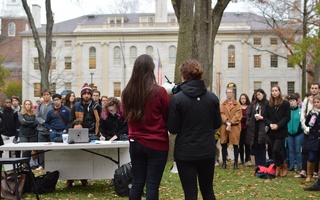Half a year after some undergraduates criticized a University-issued frequently asked questions document about sexual assault as legalistic and inaccessible, Harvard’s Title IX Office has added a new series of answers to questions about campus sexual harassment policy and procedures.
{shortcode-74a2bd93768b515c2a0787955a58f05cca2bffa8}The updated documents come as Harvard's central office for investigating sexual harassment continues to evaluate more cases. That office, the Office for Sexual and Gender-Based Dispute Resolution, has heard 40 cases since it opened in September 2014, up from 34 in February, according to Mia Karvonides, the University’s Title IX Officer.
The documents, an expansion on the list of “Frequently Asked Questions” released last semester, include an additional 14 questions and answers, a flow chart detailing how the ODR investigates complaints of sexual harassment, and a list of sexual assault resources from the University, Cambridge and Boston, and Massachusetts state.
Karvonides said she hopes the new documents, the result of student consultation and meetings, will better clarify students’ questions and confusion about the University’s sexual harassment procedures.
"We knew the first of FAQs was really responding to questions about the legal basis and we knew that there would be other questions that needed to be explored and that are really more responsive to students’ day to day experiences,” Karvonides said.
Last semester, the Title IX Office released 10 pages of FAQs, a stipulation of the Title IX resolution agreement Harvard signed with the Department of Education’s Office for Civil Rights after that agency found Harvard Law School in violation of Title IX at the end of 2014. That initial document clarified, among other points, that students may use attorneys as personal advisers over the course of a sexual harassment investigation.
Some student activists quickly denounced the initial document as legalistic and inaccessible. The Title IX Office has now crafted the additional questions to respond to student concerns and questions.
Beyond information about interim measures that students may seek over the course of a sexual harassment investigation, the new document also contains questions about the timeframe of ODR investigations, filing anonymous complaints, and how ODR works with the Harvard University Police Department. The FAQ document now also includes statistics about ODR complaints. Karvonides said that at the time the document was prepared, ODR had received 36 formal complaints, 13 of which involved parties in a dating or close relationship.
“I think this does a much better job of breaking things apart in a way that students can understand and it’s more relevant to a students’ experience,” Drisana M. Mosaphir ’17, a member of Our Harvard Can Do Better who helped craft the new FAQs, said.
Karvonides said that she and other students decided to incorporate all of the FAQs into the same document, rather than splitting them into different items, so that the secondary resources would not include redundant explanations of the policy and procedures.
Both Karvonides and Mosaphir said the new points of guidance will help better answer student questions as the Title IX office develops additional secondary resources.
"We’ll continue to develop things and really welcome input from people about whether these resources are helpful or whether they feel there are other things we should be developing," Karvonides said.
The expanded secondary materials about Harvard’s sexual harassment policy and procedures come as a host of administrators and students across the University focus on Title IX compliance and sexual assault. Earlier this semester, a University-wide task force dedicated to sexual assault prevention released its final report, calling for mandatory, annual sexual assault prevention training, among other recommendations.
A committee of faculty, students, and staff from across Harvard has also begun meeting to study and potentially reconsider Harvard’s Title IX framework. A federal investigation into the College’s compliance with Title IX remains ongoing.
—Staff writer Andrew M. Duehren can be reached at andy.duehren@thecrimson.com. Follow him on Twitter @aduehren.
Read more in College News
'Tonight Show' Drummer Connects Music and FoodRecommended Articles
-
Title IX Office Launches New WebsiteThe central Title IX office's new website provides information about Title IX policies and procedures, continuing a push to better inform students, faculty, and staff.
-
 Title IX Officer Mia Karvonides to Leave Harvard
Title IX Officer Mia Karvonides to Leave Harvard -
 DeVos Title IX Review Sparks Concern From Activists
DeVos Title IX Review Sparks Concern From Activists -
 Reports of Sexual Harassment at Harvard Increase Amid National Movement
Reports of Sexual Harassment at Harvard Increase Amid National Movement -
 Forty Years in the Making: Dominguez and Sexual Misconduct At Harvard
Forty Years in the Making: Dominguez and Sexual Misconduct At Harvard













